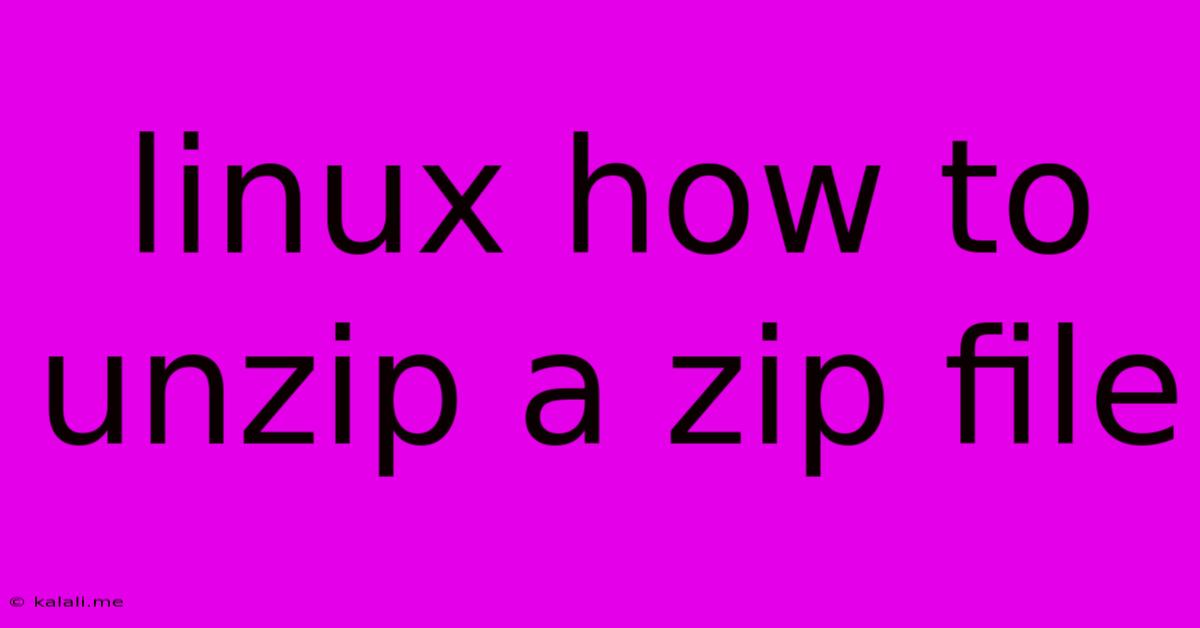Linux How To Unzip A Zip File
Kalali
May 23, 2025 · 3 min read

Table of Contents
How to Unzip a Zip File in Linux: A Comprehensive Guide
Unzipping files is a common task for any Linux user. Whether you're downloading software, accessing project files, or working with compressed archives, knowing how to unzip files efficiently is crucial. This guide covers various methods to unzip .zip files in Linux, from using the command line to leveraging graphical file managers. We'll also address troubleshooting common issues you might encounter.
Understanding Zip Files
Zip files (.zip) are compressed archives that bundle multiple files and folders into a single package. This reduces storage space and makes it easier to transfer large amounts of data. Unzipping, or extracting, a zip file restores its contents to their original state.
Methods to Unzip Zip Files in Linux
Several methods allow you to unzip zip files in Linux, each with its own advantages and disadvantages.
1. Using the unzip Command (Command Line)
The unzip command is a powerful and versatile tool built into most Linux distributions. It's ideal for batch processing or scripting.
Basic Usage:
To unzip a file named my_archive.zip in the current directory, simply use:
unzip my_archive.zip
This command extracts all files and folders into the current directory.
Specifying Extraction Directory:
To extract files to a specific directory, use the -d option:
unzip -d /path/to/destination/ my_archive.zip
Replace /path/to/destination/ with the desired directory. This is best practice to avoid cluttering your working directory.
Overwriting Existing Files:
By default, unzip will refuse to overwrite existing files. To force overwriting, use the -o option (use with caution!):
unzip -o my_archive.zip
Listing Files Without Extracting:
To see the contents of a zip file without extracting, use the -l option:
unzip -l my_archive.zip
Other Useful Options:
-q: Quiet mode (suppresses messages)-v: Verbose mode (shows detailed information)-n: Do not overwrite existing files
2. Using Graphical File Managers
Most graphical file managers in Linux (like Nautilus, Dolphin, Thunar) provide a built-in functionality to unzip zip files. Simply right-click on the .zip file and select the "Extract Here" or a similar option. The files will be extracted to the same directory. This method is more intuitive for beginners.
3. Using 7-Zip (for Enhanced Compatibility)
While unzip handles most .zip files effectively, 7-Zip offers broader compatibility with various archive formats, including .zip, .7z, .rar, and others. It's available as a package in most distributions. You can usually install it through your distribution's package manager (e.g., apt on Debian/Ubuntu, dnf on Fedora/CentOS/RHEL, pacman on Arch Linux). Once installed, you can use its graphical interface or command-line tools similarly to unzip.
Troubleshooting Common Issues
- Permission Errors: If you encounter permission errors, try using
sudobefore the command (e.g.,sudo unzip my_archive.zip). Be cautious when usingsudoand ensure you understand the implications. - Corrupted Zip Files: If the zip file is corrupted, the
unzipcommand may fail. Try using a different unzip utility or a file repair tool. - Unsupported Compression: Some zip files may use unusual compression methods. 7-Zip often has better support for less common compression algorithms.
Conclusion:
Unzipping files in Linux is straightforward using either the command line or graphical interfaces. The unzip command provides flexibility and control, while graphical managers offer ease of use. Understanding these methods empowers you to manage compressed files effectively within your Linux environment. Remember to always be mindful of file permissions and consider using a tool like 7-Zip for broader compatibility.
Latest Posts
Latest Posts
-
Can Romex Be Run In Conduit
May 24, 2025
-
Blender Face Orientation Darker Than Normal
May 24, 2025
-
What Did Auggies Dad Give His Mom
May 24, 2025
-
X Sin 1 X Is Absolute Continuous
May 24, 2025
-
Washing Machine Drain Is Backing Up
May 24, 2025
Related Post
Thank you for visiting our website which covers about Linux How To Unzip A Zip File . We hope the information provided has been useful to you. Feel free to contact us if you have any questions or need further assistance. See you next time and don't miss to bookmark.